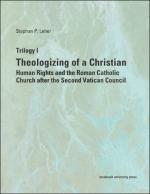Theologizing of a Christian
Human Rights and the Roman Catholic Church after the Second Vatican Council Triology I–III
Author(s)
Leher, Stephan P.
Collection
AG UniversitätsverlageLanguage
EnglishAbstract
The first part of the Trilogy explicates the bedrock conviction that women, men and queer realize their physical, psychic, social and spiritual integrity with the help of speech acts. I describe speech acts as social choices of speakers and listeners who reciprocally enhance their equal dignity, freedom and rights in a discourse. I make clear that the investigation of the state of the integrity of the individual person is a matter for empirical science; I call the experience to be consciously enjoying my integrity, the mystical experience. In the second part of the Trilogy, I talk about personal mystical experiences, meditations and about basic convictions concerning my Christian faith. As validity condition of the validity of any religious claim, I discuss their correspondence with the principles of the Universal Declaration of Human Rights, notably the recognition and respect of the equal dignity, freedom and rights of all women, men and queer. The third part of the Trilogy completes my systematic investigation of the official teachings of the Roman Catholic Church as promoted in the 16 documents of the Second Vatican Council (1962-1965). A Council serves the Roman Catholic Church to describe the essence and purpose of her being and I analyze this purpose and essence within the historical context of the making of the 16 texts of the Second Vatican Council. My investigation shows that throughout the documents there is an ambivalent parallelism between two contradicting descriptions of the Roman Catholic Church. The texts show that there is the social institution of the Roman Catholic Church as an absolute monarchy with an authoritarian and discriminating hierarchical structure and that there is the faith institution of the Roman Catholic Church as the People of God and the Gospel of the just world of Jesus Christ. I hold that the social institution of the Roman Catholic Church needs to change, because of the essence and purpose of a Church as a community of faithful. I present a social model for the Church that realizes the dignity of the individual faithful as the social choice of the individual woman, man and queer. Dignity includes the social choice to give away some freedom and rights to women, men and queer as possibility condition for the social realization of their dignity. Giving away something of my freedom and rights for the social realization of the dignity of others enhances the dignity of both, my dignity and the dignity of the others. This mutual enhancement of dignity constitutes not only a basic function for operating democracies but constitutes also a basic element of the just world of God.
Keywords
Theology; Roman Catholic Church; Human RightsDOI
10.15203/99106-051-2ISBN
9783991060512, 9783991060512, 9783991060512Publisher
innsbruck university pressPublisher website
https://www.uibk.ac.at/iupPublication date and place
Innsbruck, 2021Classification
Christianity
Theology
Public international law: human rights


 Download
Download Web Shop
Web Shop